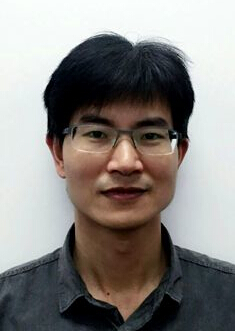
| Name: | Haikun WANG | Gender: | 男 |
|---|---|---|---|
| Education: | |||
| Academic degree: | PhD | Academic title: | PI |
| Departments: | The regulation of immune cell differentiation unit | Discipline: | Immunology |
| Phone: | 021-54923180 | E-mail: | hkwang@ips.ac.cn |
| Mailing Address: | Institut Pasteur of Shanghai, Chinese Academy of Sciences Life Science Research Building ,320 Yueyang Road, Xuhui District, 200031 | ||
| Curriculum vitae: |
|---|
Haikun Wang, Peking University bachelor of medicine, master of cell biology, Chinese Academy of Medical Sciences & Peking Union Medical College Dr. of Biology. Have the postdoctoral experience in succession at the University of Pennsylvania and The Wistar Institute. Since August 2014, as the team leader of “The regulation of immune cell differentiation” unit, in Institute Pasteur of Shanghai, Chinese Academy of Sciences,as the research background in The regulation of immune cell differentiation, 2015, in “1000-talents Plan” for young researchers by the General Office of the Central Committee of the Chinese Communist Party. Haikun Wang, focus on the research of T cell quiescence and the differentiation of Follicular helper T cells since 2005. So far, as the first author Wang has published 16 SCI papers (including 2 Nature Immunology articles), wrote 1 review, and got 1 international patent. |
| Research direction: |
|---|
Production of high affinity and long-lived antibodies by immune cells is critically essential for protection against infectious diseases, and it is also the foundation of most effective vaccines. Our research aims to understand transcriptional regulation in the development and function of Follicular Helper T (TFH) cells and B cells, two key components of humoral immunity. Knowledge obtained in our studies will facilitate new vaccine development, meanwhile offering new strategies for the treatment of infectious diseases such as HIV and influenza. 1. Transcriptional regulation in TFH cells development. Follicular helper T cells (TFH cells) are a specialized CD4+ T cell subset that provides B cell help for germinal center formation. TFH cells are characterized by the expression of surface molecules that facilitate functional interactions with B cells such as the chemokine receptor CXCR5, ICOS and PD-1. The transcription factor Bcl-6 is a central regulator of TFH cell differentiation, and the cytokine interleukin 21 is a key cytokine for both TFH and germinal center B cell differentiation. Although the essential function of TFH for germinal center formation has been elucidated, how TFH cells differentiate from CD4+ effector T cells remains unclear. We are interested in the key signaling pathways and transcription factors involved in T differentiation and functions. 2. Transcriptional regulation of mature B cell differentiation. Mature B cell differentiation is also a complex process. After encountering antigen and receiving cognate T cell help, mature B cells form germinal centers in the follicles, where B cells undergo clonal expansion, selection, and differentiation into either memory B cells or plasma cells. At each differentiation step, distinct regulatory networks are engaged to regulate the B cell proliferation, survival and differentiation. Perturbations in B cell differentiation give rise to certain types of lymphoma. Here, we aim to identify novel stage-specific transcriptional networks that regulate mature B cell differentiation, with a particular focus on the molecules that are known to be associated with the pathogenesis of B lymphomas. Built on our past work, our current study will focus on the roles of Foxp1 in mature B cells differentiation and human B cell lymphomas. |
| Research progress: |
|---|
Publications: 1.Wei H, Geng J, Shi B, Liu Z, Wang YH, Stevens AC, Sprout SL, Yao M, Wang H, Hu H. Cutting Edge: Foxp1 Controls Naive CD8+ T Cell Quiescence by Simultaneously Repressing Key Pathways in Cellular Metabolism and Cell Cycle Progression. J Immunol.2016; 196(9):3537-41. 2.Yang Q, Li F, Harly C, Xing S, Ye L, Xia X, Wang H, Wang X, Yu S, Zhou X, Cam M, Xue HH, Bhandoola A. TCF-1 upregulation identifies early innate lymphoid progenitors in the bone marrow. Nature Immunology. 2015;16(10):1044-50. 3.Wang H, Geng J, Wen X, Bi E, Kossenkov A, Wolf A, Tas J, Choi Y, Takata H, Day T, Chang LY, Sprout S, Becker E, Willen J, Tian L, Wang X, Xiao C, Jiang P, Crotty S, Victora G, Showe L,Tucker H, Erikson J and Hu H. The transcription factor Foxp1 is a critical negative regulator of T follicular helper cell differentiation. Nature Immunology.2014; 15(7):667-75. 4.Feng X, Wang H, Takata H, Day TJ, Willen J, Hu H. Transcription factor Foxp1 exerts essential cell-intrinsic regulation of the quiescence of naive T cells. Nature Immunology. 2011; 12(6):544-550 (equal first authorship, listed in alphabetical order |
| Laboratory members: |
|---|
Principal Investigator: Haikun Wang, PhD, Professor Research assistant: Xiaoyan Chang Post-doctoral fellow: Min Yao PhD Candidate: Meng Wang, Shilin Gao, Jiazi Ren, Jinyi Tang, Xiaoxue Deng MD Candidate: Junxiang Li Dr Intern: Lei Han(Huashan hospital of fudan university MD Intern: Chun Jin(Zhongshan Hospital ) Co-supervising Ph.D students: Yuanyuan Huang( Xiao Su’s Lab) Co-supervising M.S students: Fangming Zhu (Shanghai University) |